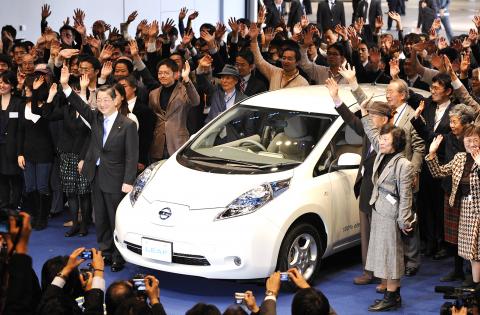Japan’s Nissan Motor Co delivered the first mass-market all-electric car to a technology entrepreneur in California on Saturday as the company tries to get a jump in the nascent green vehicle race.
The first customer, Olivier Chalouhi, has been riding an electric bicycle to work, and he plugged his new car in for the cameras outside San Francisco City Hall. The charge point, one of 400 in the region, had a green official city sign near it that said: “Green Vehicle Showcase: Cars that make a difference.”
The Leaf is one of a handful of mass-market fully electric or extended range plug-in vehicles slated to reach consumers in the next year.

PHOTO: AFP
The battery-powered Leaf, with an Environmental Protection Agency (EPA)-certified battery-only range of 120km is due to hit showrooms this month in a limited roll-out — along with Chevy Volts by General Motors Co. Ford Motor Co expects to deliver its first electric Focus compact cars late next year.
Carlos Taveras, the North American head of Nissan, said his company would focus on satisfying the first 20,000 Leaf customers before opening up for more orders next year.
“We are not in a rush,” he told reporters, reasserting Nissan’s plan to go straight to zero--emission cars, as opposed to the Volt with its gasoline engine that can recharge the battery to give it more range.
Work at Nissan’s Tennessee plant was under way to have production capacity for 100,000 -battery packs by early 2013, Taveras said, though he said that was not an indication of expected demand for the car.
California, the most populous US state, is the biggest market for conventional cars and is expected to be the biggest one for electric vehicles as well. The fact the Leaf is eligible for the California rebate, while the Volt is not, will be a selling point for Nissan.
The Leaf is also set to be delivered to Oregon, Seattle, Tennessee and Arizona, followed by Hawaii and Texas shortly after that.
As a pure electric car, the Leaf tops the Volt in the category on the EPA label that tracks greenhouse gas emissions from the vehicle. Since it carries no combustion engine, the Leaf has no such emissions, although greenhouse gases would be produced by the power plants used to recharge the car.
The Leaf will be priced at about US$32,780 before a federal tax credit can bring the sticker price to about US$25,280 and, in California, a rebate that can reduce it to about US$20,280.
Chevy’s Volt is rated at 52g of carbon dioxide per kilometer, less than one-tenth of the industry’s worst-performing vehicle on that score.
The Volt is designed to run for 56km on a full charge of its 181kg lithium-ion battery pack supplied by a unit of Korea’s LG Chem. After that, a 1.4L engine extends the driving range to about 610km.
GM plans to build 10,000 Volts next year, 45,000 in 2012 and has begun discussing ways it could increase the production should there be more demand.

Real estate agent and property developer JSL Construction & Development Co (愛山林) led the average compensation rankings among companies listed on the Taiwan Stock Exchange (TWSE) last year, while contract chipmaker Taiwan Semiconductor Manufacturing Co (TSMC, 台積電) finished 14th. JSL Construction paid its employees total average compensation of NT$4.78 million (US$159,701), down 13.5 percent from a year earlier, but still ahead of the most profitable listed tech giants, including TSMC, TWSE data showed. Last year, the average compensation (which includes salary, overtime, bonuses and allowances) paid by TSMC rose 21.6 percent to reach about NT$3.33 million, lifting its ranking by 10 notches

Popular vape brands such as Geek Bar might get more expensive in the US — if you can find them at all. Shipments of vapes from China to the US ground to a near halt last month from a year ago, official data showed, hit by US President Donald Trump’s tariffs and a crackdown on unauthorized e-cigarettes in the world’s biggest market for smoking alternatives. That includes Geek Bar, a brand of flavored vapes that is not authorized to sell in the US, but which had been widely available due to porous import controls. One retailer, who asked not to be named, because

SEASONAL WEAKNESS: The combined revenue of the top 10 foundries fell 5.4%, but rush orders and China’s subsidies partially offset slowing demand Taiwan Semiconductor Manufacturing Co (TSMC, 台積電) further solidified its dominance in the global wafer foundry business in the first quarter of this year, remaining far ahead of its closest rival, Samsung Electronics Co, TrendForce Corp (集邦科技) said yesterday. TSMC posted US$25.52 billion in sales in the January-to-March period, down 5 percent from the previous quarter, but its market share rose from 67.1 percent the previous quarter to 67.6 percent, TrendForce said in a report. While smartphone-related wafer shipments declined in the first quarter due to seasonal factors, solid demand for artificial intelligence (AI) and high-performance computing (HPC) devices and urgent TV-related orders

Prices of gasoline and diesel products at domestic fuel stations are this week to rise NT$0.2 and NT$0.3 per liter respectively, after international crude oil prices increased last week, CPC Corp, Taiwan (台灣中油) and Formosa Petrochemical Corp (台塑石化) said yesterday. International crude oil prices last week snapped a two-week losing streak as the geopolitical situation between Russia and Ukraine turned increasingly tense, CPC said in a statement. News that some oil production facilities in Alberta, Canada, were shut down due to wildfires and that US-Iran nuclear talks made no progress also helped push oil prices to a significant weekly gain, Formosa said